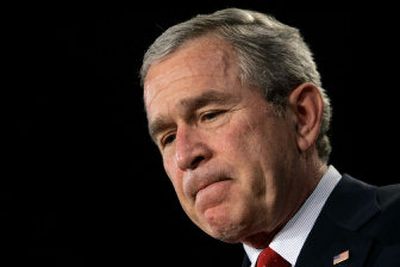Can Bush repair the damage?

WASHINGTON – The prosecution’s case against White House adviser I. Lewis “Scooter” Libby pulls back the curtain on the Bush administration’s efforts to silence its critics and challenges its rationale for war with Iraq.
The stain on President Bush’s presidency starts with Libby, but it’s not likely to end there, even with Libby’s resignation Friday. The only bright spot for Bush in an otherwise dismal week was that presidential adviser Karl Rove wasn’t indicted, at least for now. Rove, one of Bush’s closet confidants, remains under investigation.
The five-count indictment raises new questions about whether Vice President Dick Cheney had any role in revealing the identity of undercover CIA officer Valerie Plame. A Libby trial almost certainly would delve into internal White House deliberations that could provide more embarrassment for Bush, who’d promised to bring a new ethical climate to Washington.
The indictment came near the end of one of the worst weeks in Bush’s presidency. His approval ratings are at the lowest point since he took office, the American death toll in Iraq topped 2,000, Supreme Court nominee Harriet Miers withdrew under pressure and his usually loyal conservative supporters served noticed that they’ll no longer march in lockstep behind him.
“Everything seems to be blowing up at the same time,” said Charles Walcott, a political science professor at Virginia Polytechnic Institute and State University in Blacksburg, Va.
Bush’s name doesn’t appear anywhere in the 22-page indictment, but his reputation is inextricably linked to the case. Even beyond the alleged criminal wrongdoing, the indictment offers an unflattering portrait of a White House with little tolerance for dissent and a no-holds-barred attitude toward its critics.
“It raises questions about the way the White House punishes its political rivals. It’s a White House that is intent on doing anything and everything possible to protect the president, a White House where, in Bush’s own words, you’re either with us or against us,” said William Chafe, a Duke University historian.
According to the indictment, Cheney, Libby and other top officials zeroed in on Plame’s husband, former Ambassador Joseph Wilson, long before Wilson publicly accused the administration of exaggerating the evidence of weapons of mass destruction in Iraq.
Wilson contends that White House officials exposed his wife’s role at the CIA to retaliate for his criticism. Wilson, whom the CIA dispatched to Africa in 2002 to investigate allegations that Iraq had shopped for bomb-making uranium in Niger, publicly challenged the case for war in a newspaper article and television interviews on July 6, 2003.
The indictment says Libby, Cheney’s chief of staff and an assistant to Bush, began digging into Wilson’s background May 29, more than a month before Wilson went public with his complaints. Prosecutors concluded Libby learned of Wilson’s wife and her CIA job from Cheney on June 12.
The indictment notes that Libby discussed how to deal with media inquiries about Wilson during a July 12 plane trip with Cheney and other White House officials. Later that day, the indictment says, he discussed Wilson’s wife with reporters from Time magazine and the New York Times.
Although Wilson was a bit player in the run-up to war, his criticism challenged a key element of the administration’s claim that Iraq had been manufacturing weapons of mass destruction for possible use by terrorists.
Bush’s critics said the revelations in Libby’s indictment pointed to a concerted effort by top administration officials to mislead the American public. Some Democrats called for a congressional investigation.
“The full facts of the case, including the role of Vice President Cheney, will come out at Libby’s trial. But one thing is beyond dispute: Senior officials at the White House set out to discredit Ambassador Wilson, who contradicted the administration’s claim that Iraq was acquiring nuclear material,” said Rep. Jane Harman of California, the top-ranking Democrat on the House Intelligence Committee. “They did this in an insidious way, by exposing the identity of his wife.”
Some analysts questioned whether Bush can ever regain the power that he once enjoyed.
“I very much doubt they will be able to repair the damage. Once you lose credibility, it’s almost impossible to get it back. I don’t know if this is comparable to Watergate, but it seems to be exploding,” said Tom De Luca, a political science professor at Fordham University.
After his miserable week, Bush retreated to the presidential hideaway at Camp David in Maryland to continue his search for a new Supreme Court justice, but not before trying to shift public focus to a new subject.
“While we’re all saddened by today’s news, we remain wholly focused on the many issues and opportunities facing this country,” Bush said before TV cameras after the indictments had been announced. “I got a job to do, and so do the people who work in the White House. We got a job to protect the American people, and that’s what we’ll continue working hard to do.
“I look forward to working with Congress on policies to keep this economy moving. And pretty soon I’ll be naming somebody to the Supreme Court,” Bush added, then walked across the South Lawn to his waiting helicopter.